Ethics Need Not Apply: The Dark Side of Law

Advertising for legal services is slowly but surely advancing. Lawyers first won the right to advertise in newspapers, then they progressed to phone books, and now they have moved online. But a handful of enterprising lawyers aren’t satisfied with traditional digital ads, instead they choose to advertise their services on underground markets and the dark web. Their motives are mixed—some may have lost their licenses and can no longer practice out in the open, others are overzealous law students, and there are those who are simply impersonating legal experts but have no legitimate education. However, there are also struggling – though steadfastly ethical – lawyers, who simply want to generate income on a new frontier.
In the cybercriminal underground, people can easily purchase drugs, stolen records, malware, and more. Unsurprisingly, we saw legal services advertised that were connected to criminal activities—fugitive extraction, forgery of official documents, and money laundering to name a few. But in the course of our research, we also saw that lawyers were offering legitimate legal advice in matters related to family law, criminal law, real estate law, and business. In itself, advertising legal services on these marketplaces does not equate to participating in illegal activities, but it may be in an ethical gray area.
Our investigation of legal services in the underground covered a period between March 2018 and October 2018. The “legal underground” discussed covers exchanges in marketplaces, the dark web, and cybercriminal forums within the United States, Russia and Europe.
The History of Legal Advertising
The underground market and the dark web is poorly understood in the legal community and suffers from reputational stigma (though much of it is well-founded). Traditionally, the American legal profession had banned legal advertising under the belief that advertising was unbecoming of the profession and could enable crafty lawyers to prey upon the naïveté of the general public. Over time, a series of first amendment cases in the United States culminated with the Supreme Court’s decision to hear the case of John Bates and Van O’Steen, who had petitioned the court to compel the State Bar of Arizona to permit them to advertise their services. The pair had graduated from Arizona State University College of Law in 1972 and quickly formed a legal clinic that targeted the poor but was teetering on the verge of failure due to lack of awareness among the general public. Bates and O’Steen decided to place an advertisement in the Arizona Republic in a final effort to salvage their practice, which the Supreme Court ultimately included in the appendix of the its decision (Bates v. State Bar of Arizona). The Supreme Court held that a state bar is prohibited from “preventing the publication in a newspaper of … truthful advertisement concerning the availability and terms of routine legal services.”
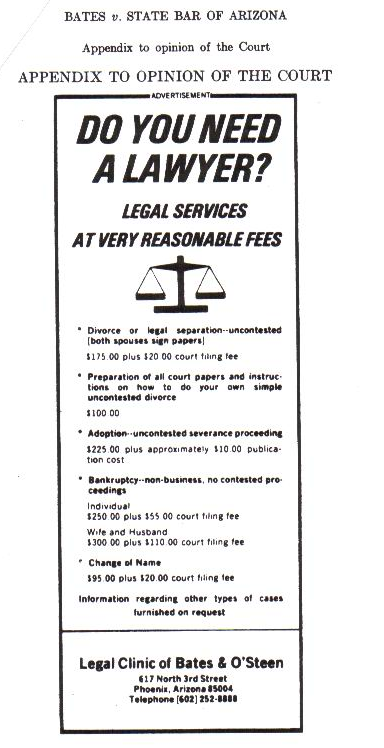
Advertisement Bates v State Bar of Arizona, 433 U.S. 350 (1977)
Following the Bates decision, lawyers across the United States began advertising in droves, exploring the capabilities of different media to reach prospective clients, from radio and television to the Yellow Pages and Google ads. In 2015, the State Bar of Florida explicitly granted permission for lawyers to advertise directly to prospective clients via text message.
The American Bar Association’s decision to modernize its rules aspired to rectify the “breathtaking variation in advertising rules” that different state bars had promulgated, according to Lucian Pera, who is the current chair of the American Bar Association’s Center for Professional Responsibility. Resolution 101 was perfected by the American Bar Association’s Standing Committee on Ethics and Professional Responsibility over the course of two years. Specifically, Model Rules 7.1 and 7.2 now state:
“Model Rule 7.1: Communications Concerning a Lawyer’s Services
A lawyer shall not make a false or misleading communication about the lawyer or the lawyer’s services. A communication is false or misleading if it contains a material misrepresentation of fact or law, or omits a fact necessary to make the statement considered as a whole not materially misleading.
Model Rule 7.2: Communications Concerning a Lawyer’s Services
(a) A lawyer may communicate information regarding the lawyer’s services through any media…”
These changes represent the heart of the American Bar Association’s modifications to its rules and will be considered for adoption by the different state bars in the coming months. The changes are unambiguous and would authorize lawyers to advertise on the underground market in the United States of America, provided those rules are adopted in the current form by each of fifty-one state jurisdictions. The American Bar Association clearly contemplates the multijurisdictional practice of law and the utility of the internet to transcend state and national borders, which could be a decisive factor in a lawyer’s decision to turn to the dark web or cybercriminal forums for solicitation of prospective clients.
Of course, it should be noted that traditional rules stewarding the integrity of the profession would still apply to lawyers who pursue advertising on any media. For example, someone cannot present themselves as a lawyer if he or she does not possess the qualifications to do so. The prohibition on the unauthorized practice of law would apply to non-lawyers, as well as to lawyers who are not licensed to provide legal services in specific jurisdictions. In other words, a lawyer who is licensed to provide legal services only in California, could not advertise that he or she is authorized to do so in New York. Model Rule 4.1 requires lawyers to be truthful in statements to others. Lawyers would not be able to misrepresent the scope of their experience on the underground market or to advertise for services, which are illegal. Similarly, rule 8.4 prohibits lawyers from engaging in misconduct. The rule is intended to safeguard the reputation of the American legal profession and is worth reciting in full:
“Maintaining the Integrity of the Profession
It is professional misconduct for a lawyer to:
(a) violate or attempt to violate the Rules of Professional Conduct, knowingly assist or induce another to do so, or do so through the acts of another;
(b) commit a criminal act that reflects adversely on the lawyer's honesty, trustworthiness or fitness as a lawyer in other respects;
(c) engage in conduct involving dishonesty, fraud, deceit or misrepresentation;
(d) engage in conduct that is prejudicial to the administration of justice;
(e) state or imply an ability to influence improperly a government agency or official or to achieve results by means that violate the Rules of Professional Conduct or other law;
(f) knowingly assist a judge or judicial officer in conduct that is a violation of applicable rules of judicial conduct or other law; or
(g) engage in conduct that the lawyer knows or reasonably should know is harassment or discrimination on the basis of race, sex, religion, national origin, ethnicity, disability, age, sexual orientation, gender identity, marital status or socioeconomic status in conduct related to the practice of law. This paragraph does not limit the ability of a lawyer to accept, decline or withdraw from a representation in accordance with Rule 1.16. This paragraph does not preclude legitimate advice or advocacy consistent with these Rules.
Lastly, Rule 1.2(d) of the Model Rules of Professional Conduct, which concerns the scope of services lawyers are able to provide in the context of an attorney-client relationship, preclude a lawyer from providing assistance to a client who aspires to engage in crime or fraud:
“A lawyer shall not counsel a client to engage, or assist a client, in conduct that the lawyer knows is criminal or fraudulent, but a lawyer may discuss the legal consequences of any proposed course of conduct with a client and may counsel or assist a client to make a good faith effort to determine the validity, scope, meaning or application of the law.
As a final point, because these underground markets present unique concerns with regard to anonymity, a lawyer should consult with his or her state bar and request an informal ethics opinion before commencing to advertise on these places. Even so, given the first amendment constitutional considerations over freedom of speech raised in Bates and given the guidance of the American Bar Association’s sanctioning of any media, the issue of legal advertising on the underground market could theoretically wind up before the Supreme Court of the United States of America at some point.
The concept of lawyers advertising on the sites is extremely pertinent, with the American Bar Association voting (with no opposition) on August 6, 2018 to modernize the Model Rules of Professional Conduct, which it disseminates as recommended guidelines to all fifty-one state bars of the United States, in response to concerns about how the previous rules functioned in the Age of the Internet. It is a foregone conclusion that this issue will be considered across the fifty-one states as the calendar transitions from 2018 to 2019 by the various state bars, even if only indirectly.
2013: Finding The Dark Side of Law
Read more
Trend Micro Research first noticed advertisements for legal services in 2013 on the Silk Road, the now-defunct dark web marketplace. The advertised services promised to connect users with lawyers in the United States who specialized in banking law, commercial law, contract law, immigration law, insurance law, litigations, tax law and criminal law.
Notices for law services were also on other platforms. Also in 2013, a legal advice ad was spotted on a bitcoin forum offering help to people who represented themselves in court. The service was offered in exchange for bitcoins. The lawyer mentioned the purpose of the advertisement was to “make some extra money.”
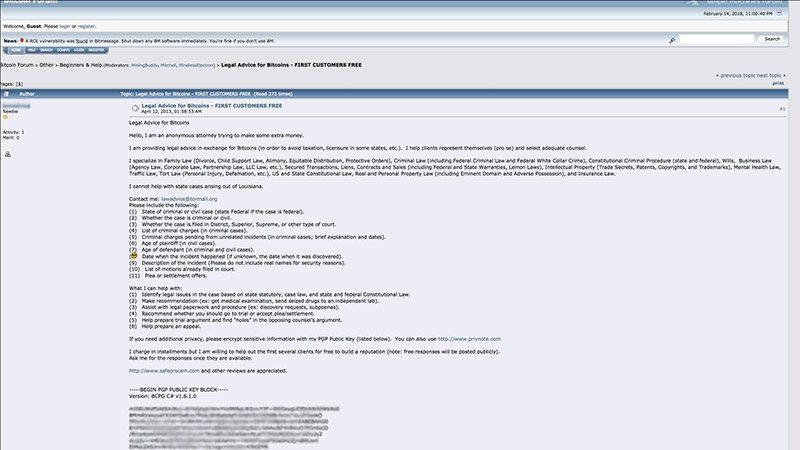
U.S. legal advice on a Bitcoin forum in 2013

Lawyer advertising services in 2013 on a Russian language forum (translated)
The Scope of Legal Services in the Underground
According to the Lawyerist podcast on Dark Web and Lawyers, law has become a stratified profession with many young lawyers earning barely $25,000 a year. Many lawyers struggle to generate new clients and so it is understandable that they try to find alternative solutions. The underground market is a prime source for clients given the prevalence of criminal activity. Also, a lawyer could build up goodwill and connections on the underground market in ways that would be impossible on the traditional internet, creating a pipeline for business opportunities. And they wouldn’t be compromising on their wages either — generally, prices for legal services underground are not that different from traditional law firms.
Can they legally represent clients?
One hurdle in connecting with clients is jurisdiction. Usually, lawyers are limited to practicing law exclusively in the jurisdiction in which they are licensed, but lawyers may wish to circumvent the prohibitions against practicing law without a license in foreign jurisdictions through the underground market. Soliciting clients on these sites helps lawyers evade regulatory bodies, making the legal underground market distinctive from other type of services and commodities commonly offered on these sites.
For clients that need legitimate representation, finding lawyers who can practice in their jurisdiction may be tricky in the underground. Some legal advertisements disclose the lawyer’s name, law firm, or licenses, but most don’t. Because this information isn’t always available in the advertisement, potential clients have to communicate with the seller (usually via Skype, ICQ, Telegram or email) to see if they can practice in their jurisdiction.
Another potential issue is that lawyers have an obligation to avoid conflicts of interest between their clients. To accomplish this requirement, lawyers have to maintain lists of all of their current and past clients and check to make sure that any new clients are not in conflict with their other clients. Since some clients on the underground may wish to remain anonymous, American lawyers could be ethically compromised because they cannot confirm whether their anonymous client has a conflict with other clients.
It should be noted, however, that jurisdiction and client-conflict rules differ depending on the country. In contrast to the United States, Russia permits two classes of lawyers, one of which is not barred and not subject to ethical regulation. In Russia, only barred “advocates” may takes criminal cases, in contrast to the latter class of unregulated lawyers, who take only civil cases. Every advocate once admitted to the bar can practice in any Russian court.
What are clients looking for?
People seeking out services on the underground likely have specific reasons for going the non-traditional route. It could be necessity — the client knows that no ethical lawyer could provide the services the client needs, and there are certain illegal requests that are only acceptable to underground lawyers. Or it could be a question of expertise — lawyers that have a presence on underground markets probably have a solid knowledge base for technical questions about cybercriminal tools or the sale of goods on the dark web. It could also just be about trust. A frequent visitor to underground markets might be more inclined to trust users who are part of the same community.
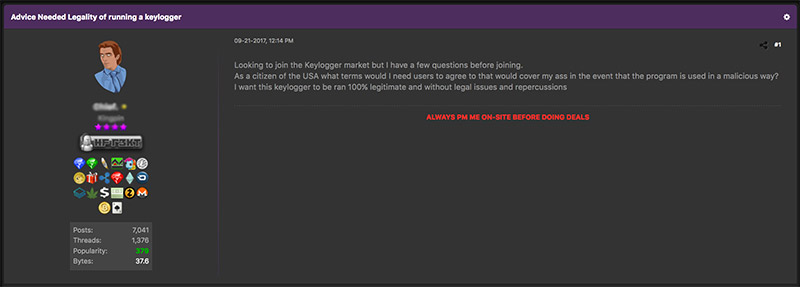
Hackforum user asking how to sell keyloggers legally
Potential clients ask for help with a variety of issues, from the mundane to the unlawful. For example, some potential clients asked for help dealing with internet scams and blackmail. Others requested legal advice resolving cases with petty theft and drunk driving. We also saw users asking for advice on how to be anonymous on the web and how to behave if they are caught doing illegal activities. And of course, there were potential clients that sought advice on the legality of running a botnet, using keyloggers, RATs, bulletproof hosting, and cryptocurrency laws — all common hacking topics on the underground.
Frequently, potential clients in Russian and English language sites requested lawyers who specialize in drafting Terms of Service (ToS). Drafting ToS start at $800 USD in the U.S., but costs over $1000 or more in Russia. ToS statements are meant to protect the seller from liability for any damages arising from the use of their website or product, but it is not always foolproof.

Hack Forum user asking for assistance with drafting Terms of Service
What legal services are advertised?
We discovered legal discussions in English, Spanish, German, and Russian forums. Most English forums discussed legal issues in their non-hacking sections while Russian underground forums have well-established sections just for legal questions. These were also spaces where users could simply ask questions, and legal experts could offer services to users in need.
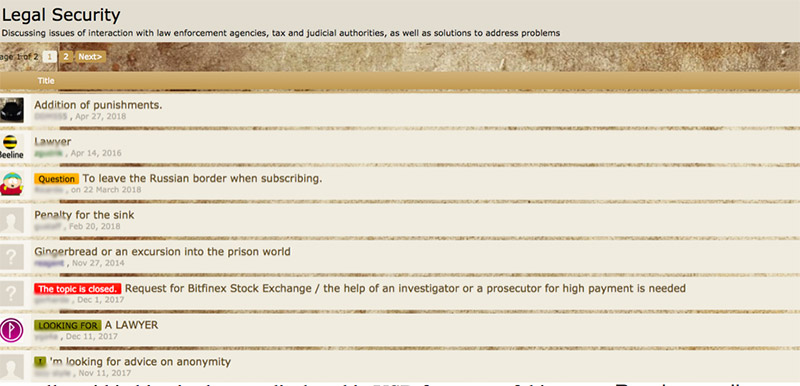
Russian carding forum with a dedicated section for legal security issues (translated)
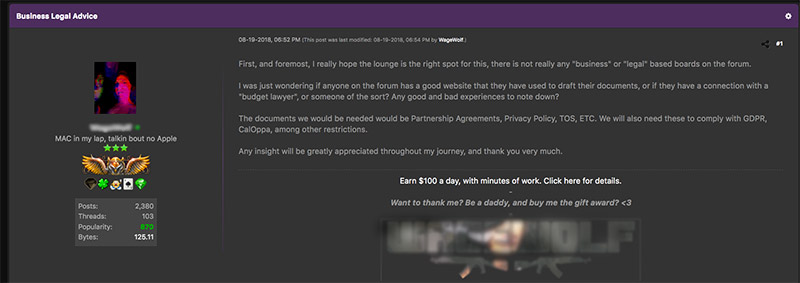
User stating there is no “legal board” in the forum and if anyone has advice on legal documents or budget lawyer to assist
New users come to these forums to explore their options as well. In early 2018, a lawyer asked members for ideas on legal services and prices on a German language hacking forum. This lawyer was cautious as he realized he “would have to look into how far this idea could be realized while still being legal.” The lawyer did not move forward with advertising legal services on this forum.
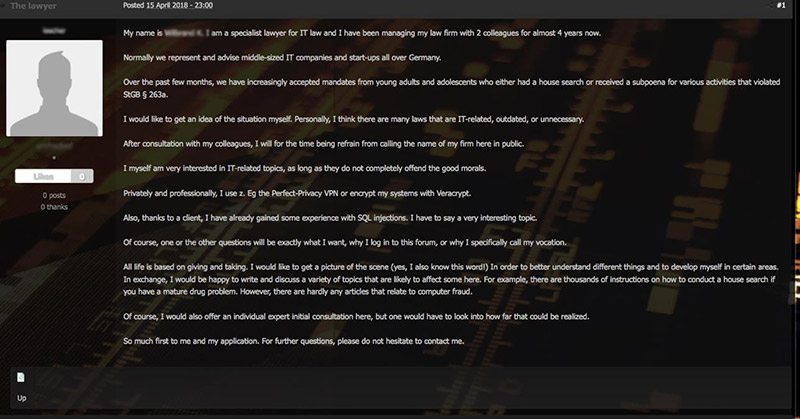
Lawyer asking questions on the German language hacking forum Toolbase (translated)
A Conversation with an Underground Lawyer
Law is a business like any other, and as such, those in the profession need a steady influx of clients to keep going. We interviewed a lawyer who is trying to expand into a largely untapped, but very interested, client base. Joseph* has started posting and advertising on the Wall St. Marketplace, which caters to English and German speaking users.
*not his real name
As of September 8, 2018 the one of his posts has had 230K+ page views. For perspective, a post on this forum usually averages only 200 views.
From an interview conducted in May: “I’ve been participating in the Wall Street forum providing advice to see if that helps people get to know my knowledge and expertise. I have received many questions through the Wall St forum site. I think I have the highest number of page views on a topic, over 150,000 so far.”
What made you decide to advertise legal services in the deep web?
“I’ve worked on criminal cases related to the dark web before and thought advertising on it would put me in the “proximity of the activity” with potential customers.”
Are your consultation fees cheaper/higher on the deep web?
“I charge $250 an hour on both places. Same price.”
What security features are you using to interact with clients on the deep web?
“I purchased a VPN service and a refurbished laptop on ebay for $99. I only connect and use that laptop for the deep web at coffee shops. I wanted to keep my personal laptop separate from this type of work.”
Read more
In April 2018, a United States lawyer posted on the Wall St. Marketplace forum asking what legal services he should offer. The forum post received over 250K views, making it one of 2018's most viewed threads. From the comments, users seemed to generally welcome the idea of legal services offered in the marketplace since many were not aware they already existed.
The American Bar Association, of course, requires that any legal advertising be truthful and not misleading. Lawyers are bound by their code of ethics not to facilitate criminal activity of their clients. Some, as stated above, offer legitimate services to those looking for help with legal matters, like drafting legal documents or help with civil cases.
However, not all advertisements conform to these ethical caveats. We saw advertisements offering non-conventional and illegal services. In English language forums, for example, lawyers offered money laundering advisory services, fugitive extraction, and sold forged identification documents.
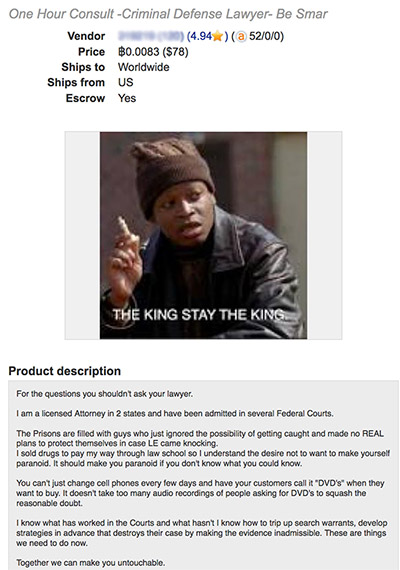
Dream Market Consultation advertisement
Meanwhile, Russian language forums offered live online courses on topics such as money laundering techniques, how to collect funds when you have been scammed, how to be anonymous, and drop services. The courses are usually voice-only with no video and can include additional consultation services to be provided after the class for a fee. Our research discovered these online courses started around 2013, costing as low as US$100. Furthermore, Russian lawyers offered stolen credit cards, discount travel services and copies of mobile call records from Russian telecom companies.
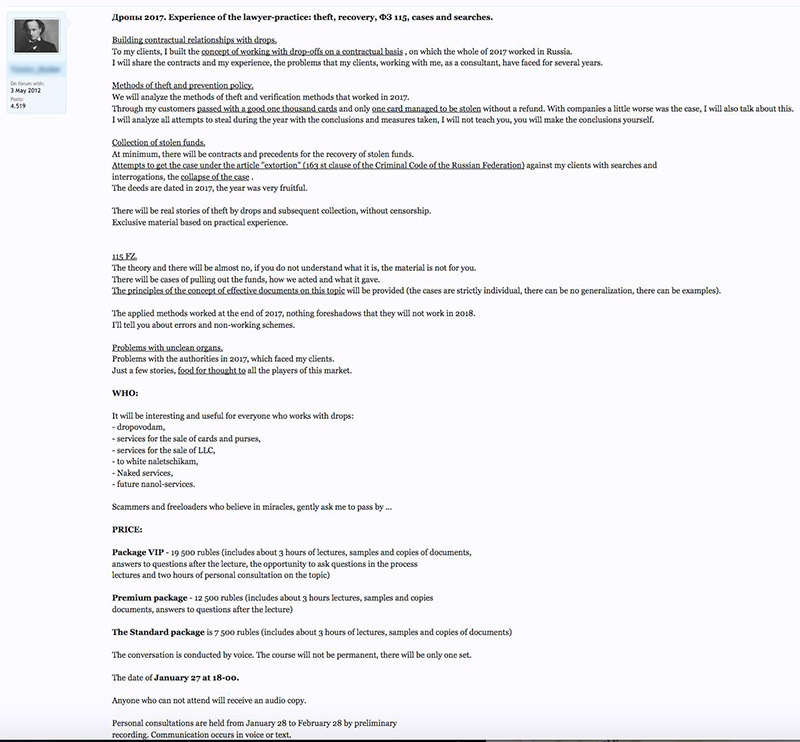
A Lawyer from a Russian-speaking forum offering online courses
Notable underground legal actors
As we dug deeper into the legal underground, we observed a few prominent sellers of legal services. Three of these sellers are profiled below, as well as details of the services they offer:
Claims to be a French law student and has advertised on several English language hacking forums. In 2017, he launched a legal services website.
Active on Russian carding forums like Probiz, claiming that he has been practicing law for over 15 years. He has been offering legal services since 2013 for family, civil, and criminal law.
Nicknamed “Abe” by his assistant, this legal expert posts on the underground Dream Market. He is supposedly an attorney licensed in two states and has been admitted into several Federal Courts.
Will the legal market continue to grow?
Legislation surrounding cybercriminal activities and privacy are getting tougher, and legislators are getting more aggressive about enforcing them. High-profile arrests have been making headlines for years, showing real-world consequences of cybercriminal operations. Mounting pressure may be prompting actors peddling illicit goods and services in underground markets to get as much legal cover as they can — and legal experts advertising on these sites are in the perfect position to help them.
Based on our research, the Russian legal underground market will continue expanding. We expect to see more underground forums dedicating sections to legal advice, based on the fact that the demand for these services has not slowed down since they first appeared in 2013. One contributing factor might be that not all Russian lawyers are barred, so there is no fallout from complaining about ethical conduct to the bar association (advokatura). This allows many types of legal services to be sold in underground forums with little fear of repercussions.
The US market is a bit different for a few reasons. Lawyers are more regulated by the State Bar Associations and they can be disbarred or banned from practicing law due to ethical or criminal complaints. However, rules are not strictly implemented. Associations typically do not have an “enforcement division” that manages ethics violations. Instead, they rely on other lawyers, and the public to a lesser degree, to report violations. A lawyer advertising on the dark web is much less likely to be seen by other lawyers, so advertisements that violate the ethics rules are less likely to be reported.
Payment for services is also an issue. In the United States, accepting bitcoins — common currency in the underground — could present a conflict of interest because of the fluctuations in value. They could actually be considered an investment. In an off-the-record conversation, one bar association employee speculated that these types of payment may be formally submitted for notice-and-comment at some point in the near future. This is a significant issue for legal experts who advertise on the underground market and do legitimate business with clients who pay in cryptocurrencies.
Lawyers who want to find clients legitimately in the underground have to tread carefully. Once the American Bar Association or the individual State Bars have provided guidance on this issue, the underground market for legal services in English language sites may rapidly change.
Though there are significant hurdles, lawyers will likely continue to advertise in the underground. The interest in these topics is on the rise, and legal experts are becoming more aware of this largely untapped client base. Given the circumstances, this seems like a corner of the internet that will continue to flourish.
"If there were no bad people, there would be no good lawyers."
- Charles Dickens
Like it? Add this infographic to your site:
1. Click on the box below. 2. Press Ctrl+A to select all. 3. Press Ctrl+C to copy. 4. Paste the code into your page (Ctrl+V).
Image will appear the same size as you see above.

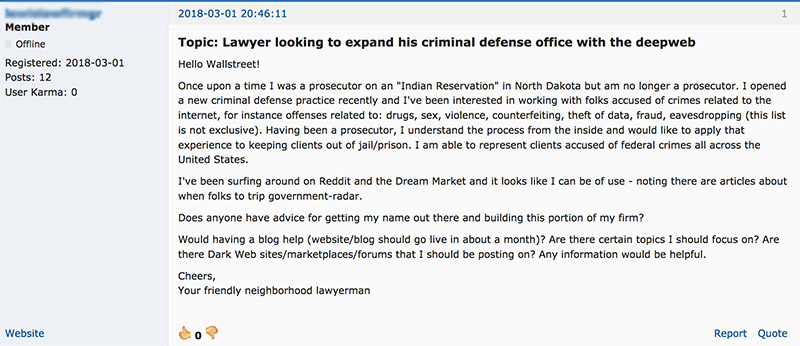
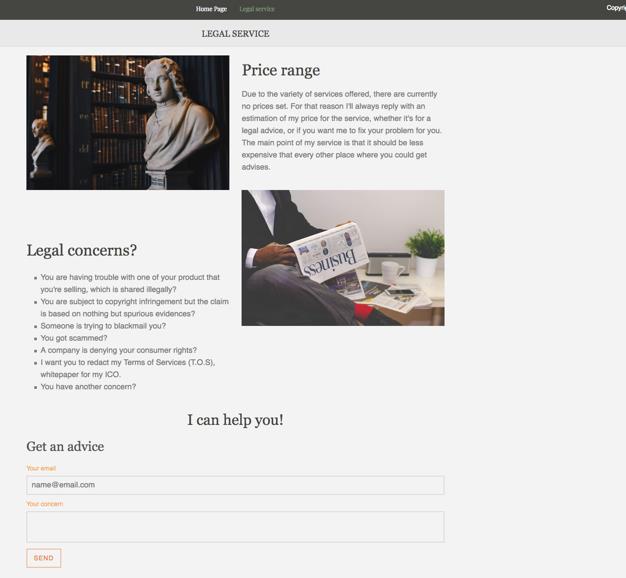

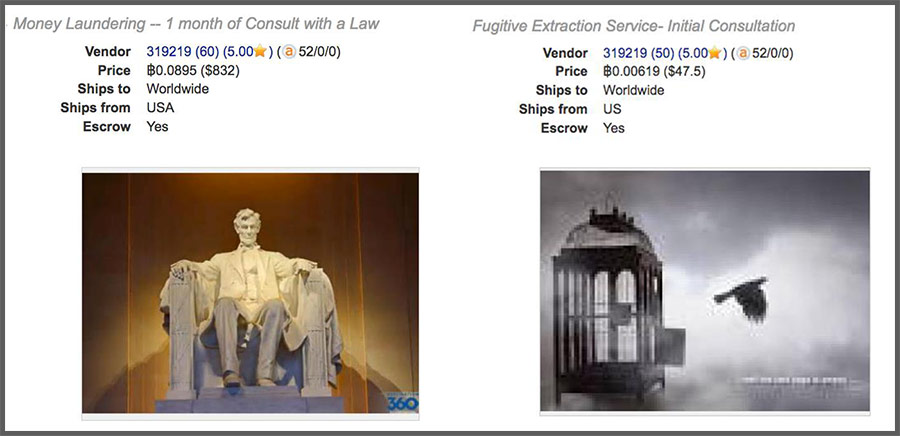
 Cellular IoT Vulnerabilities: Another Door to Cellular Networks
Cellular IoT Vulnerabilities: Another Door to Cellular Networks AI in the Crosshairs: Understanding and Detecting Attacks on AWS AI Services with Trend Vision One™
AI in the Crosshairs: Understanding and Detecting Attacks on AWS AI Services with Trend Vision One™ Trend 2025 Cyber Risk Report
Trend 2025 Cyber Risk Report CES 2025: A Comprehensive Look at AI Digital Assistants and Their Security Risks
CES 2025: A Comprehensive Look at AI Digital Assistants and Their Security Risks